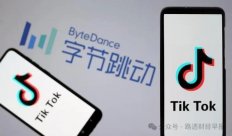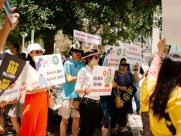In response to US Treasury Secretary Yellen talked about China's overcapacity in new energy fields such as electric vehicles, Wang Wenbin, a spokesman for the Chinese Ministry of Foreign Affairs, criticized the United States to target the advanced industries of other countries under the banner of "overcapacity".It is naked bullying and domineering.
According to the official website of the Ministry of Foreign Affairs of China, Wang Wenbin said on the routine press conference on Tuesday (May 14) that the reporter asked about it that according to the logic of the United States, the subsidy of the United States was "vital to be vital."Industrial investment", subsidies for other countries are "worrying unfair competition"; products with comparative advantages in the United States exporting to the world are "free trade", and products with comparative advantages exporting to the world are "overcapacity."
He said, "only the state officials set fire, not allowed the people to light up" in Chinese words. In American words, "I can't learn it, I said you must do it."In the final analysis, the United States is targeting the advanced industries of other countries under the banner of "excess capacity". It is a naked bullying and domineering with the pretext of "fair competition" as an excuse to trample on market economic principles and international economic and trade rules.
Wang Wenbin reiterated that the rapid development of China's new energy industry, including electric vehicles, lithium batteries, and photovoltaic products, based on continuous technological innovation, improvement of the production chain supply chain system and full market competition, obtainingThe leading position is the result of the comparative advantage and the common role of market laws, not from the so -called "subsidy".
He continued. On the contrary, in recent years, the United States has successively signed the Afrtile Act of Blade and the Science Act, and directly intervene in market resource allocation through the direct and indirect subsidies of hundreds of billions of dollars.The United States is the "big household" of industrial subsidies.
Wang Wenbin said that subsidies cannot make up for industrial competitiveness, and protection cannot keep a truly powerful enterprise.The rapid development of China's new energy industry is in line with the needs of the world economy to achieve green transformation, which is conducive to China, the United States, and the world."We advise the United States to abandon the hypocrisy and dual standards of different minds, and do not repeat the mistakes of protectiveism."
In addition, the Chinese Ministry of Commerce published on the official website on the same day, entitled that China's new energy production capacity has strongly promoted the worldArticles of green transformation and open development.The article pointed out that recently, some countries have speculated that China's "excess capacity surplus theory" has accused China's new energy industry of relying on subsidies to export a large amount of exports, and excess capacity has shocked the international market."This fallacy is contrary to the normal reason and violates the facts. The essence is the new trick of 'dual -standard' and trade protectionism."
The Chinese Ministry of Commerce said that China's new energy industry not only enriches global supply, alleviatesGlobal inflation pressure has also made great contributions to global response to climate change and green transformation.
Since April, "overcapacity" has become a new field of confrontation between China and Europe and the United States.Yellen, German Prime Minister Tsumarz, and US Secretary of State Brosky both said that China had overcapacity in the fields of electric vehicles, photovoltaic, lithium batteries and other fields.
The White House announced on Tuesday, local time, that China will impose tariffs on imported goods worth $ 18 billion ($ 24.3 billion), including electric vehicles, lithium batteries, photovoltaic batteries, key minerals, semiconductors, and semiconductors, andSteel aluminum, port cranes, etc.



